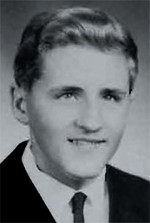Clipper Chatter
| Forum: Member Stories | |||||
|
|||||
|
Christopher Newman
 Posts: 28 View Profile |
Fort McHenry and Baltimore history "revisited" Posted Thursday, August 4, 2011 11:06 AM Had it not been for my History teacher, Mrs. Imogene Baldwin, I would not have visited Fort McHenry when I was in the eleventh grade at Patterson Park High School. Mrs. Baldwin so inspired me and fellow students in my history class that several of us decided to visit Fort McHenry in early winter of 1960. On a Saturday morning five of us met in Highlandtown and then drove to Fort McHenry (someone actually had a car) where we spent much of the day learning about our rich heritage as "Baltimoreans." Below is a portion of a book I am writing about Fort McHenry and Baltimore during the war years (War Between the States or more appropriately, "The War for Southern Independence") 1860-1865. Thank you Mrs. Baldwin! The young man of 35 years looked through the prison cell window to see a tropical sky, high over the Patapsco River and the City of Baltimore. It was mid-September, still hot and humid in Baltimore with a soft breeze coming from the southeast. Tropical cloud formations in late summer usually indicated that a hurricane was brewing off the Carolina coast. The majestic, cumulus cloud formations would sail across the Eastern Shore and the Chesapeake Bay like a fleet of William Patterson's Clipper ships - and were a clear warning to sailors and watermen that an Atlantic storm was approaching. Francis Key Howard, grandson of Francis Scott Key, was arrested and imprisoned at Fort McHenry on the morning of September 13th by order of Union General Nathaniel Banks. Forty-seven years earlier, on the same date, Howard's grandfather, Francis Scott Key, wrote the "Star-Spangled Banner" while imprisoned aboard a British warship during the 25 hour bombardment of Fort McHenry in 1814. Francis Scott Key passed away in 1843 when his grandson, Francis Key, was 17 years old. Howard, who had the good looks and courage of his paternal grandfather, Revolutionary War hero, John Eager Howard, also had the same reverence and passion for freedom as did his maternal grandfather, Francis Scott Key. As Francis Key Howard sat imprisoned in Baltimore's historic Fort McHenry, Howard penned, very fervently, the irony of his situation and the statewide assault on the freedom and property of other Marylanders by the Lincoln Administration and thousands of occupying Union soldiers. He wrote: "When I looked out in the morning, I could not help being struck by an odd and not pleasant coincidence. On that day, forty-seven years before, my grandfather, Mr. F. S. Key, the prisoner on a British ship, had witnessed the bombardment of Fort McHenry. When on the following morning the hospital fleet drew off, defeated, he wrote the song so long popular throughout the country, the "Star-Spangled Banner." As I stood upon the very scene of that conflict, I could not but contrast my position with his, forty-seven years before. The flag which he had then so proudly hailed, I saw waving at the same place over the victims of as vulgar and brutal a despotism as modern times have witnessed." On September 10, 1861, acting on orders from Abraham Lincoln, the Secretary of War, Simeon Cameron, instructed General Dix to begin the arrests of Baltimore secessionists and those Baltimoreans critical of President Lincoln. This action was begun a week prior to a scheduled secessionist convention of the Maryland Legislature which would convene in Frederick on September 17th. Following in Virginia's footsteps an Ordinance of Secession was expected to pass. Maryland Secessionists controlled over 2/3rds. of both branches of the Maryland Legislature. Lincoln's suspension of the writ of habeas corpus on April 27th was based upon his conviction that anyone who opposed his war against the South - and "Southern Independence", or who questioned his extreme and sometimes brutal methods was guilty of sedition and treason. Lincoln "would not allow" Maryland to secede. Massachusetts General, Benjamin Butler, and several thousand Union soldiers would seize and occupy Annapolis, Relay and Baltimore in May. On May 22nd., Union soldiers, under the command of Major General George Cadwalader, would confiscate a large number of arms owned by the city and private citizens. Confederate flags, which were flying all over Baltimore, were torned down and many desecrated by members of the 6th Massachusetts Regiment and New York Artillery units (occupying Federal Hill with their cannons trained on Baltimore City) under General Butler. Thirty-two Maryland Legislators were arrested and carried off to prison - without warrant, evidence or trial. Other prominent citizens, including the Mayor of Baltimore, George William Brown, Baltimore's Police Superintendent, George P. Kane and the Commissioner of Police, Charles Howard were also arrested. To control information and opinion many of Baltimore's newspaper editors and owners were arrested including Beale Richardson, William Wilkens Glenn, Thomas W. Hall and Francis Key Howard (Editor of the Baltimore Daily Exchange). In all, 9 Baltimore newspapers were suppressed. Although many of those arrested were indeed vocal Confederate sympathizers, few were actively plotting insurrection or involved in assassination conspiracies. The arrests led to a legal showdown when Chief Justice Roger B. Taney of the U. S. Supreme Court denied the president's authority to suspend the writ of habeas corpus. Taney, a Marylander, who was married to Francis Scott Key's sister, was outraged by the illegal actions taken by Lincoln including the Union Army occupation of Annapolis, Baltimore and much of Southern Maryland. Taney's decision included a blistering rebuke: "If the President of the United States may suspend the writ, then the Constitution of the United States has conferred upon him more regal and absolute power over the liberty of the citizen than the people of England have thought it safe to intrust to the Crown -- a power which the Queen of England cannot exercise at this day and which could not have been lawfully exercised by the sovereign even in the reign of Charles the First." Lincoln chose to ignore the ruling and later responded by threatening to arrest Chief Justice Taney. The more vociferous talk of assassination and sedition usually came from pro-South military groups in Baltimore, among them the Constitutional Guards, Palmetto Guards, Knights of Liberty and the Knights of the Golden Circle. The "Blood Tubs", not to be reckoned with, controlled the streets at night in Baltimore City and hated, with great passion, Abraham Lincoln and the Yankee Abolitionists. Baltimore Unionists kept a very low profile in Baltimore from 1860 through 1863. Baltimore gentlemen and those from old Maryland families would drink their whiskey and smoke their cigars at the prestigious Maryland Club, Barnum's Hotel on Calvert and Fayette Streets, and Guy's Hotel and Restaurant also located near the harbour basin. All of these organizations and institutions were under the watchful eye of Pinkerton agents and Union spies. And while Baltimore gentlemen envisioned a "Star for Maryland" on the First National Flag of the Confederacy, Union spies took down names and addresses. * For those interested in this subject, from a Maryland perspective, you would enjoy Adam Miller's book, "The North and the South and Secession". Visit www.lulu.com/tower7. Christopher Newman, Class of 1961, August 4, 2011
|
||||
|
|||||

